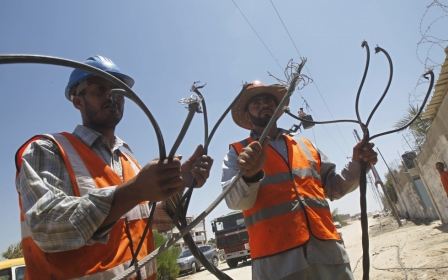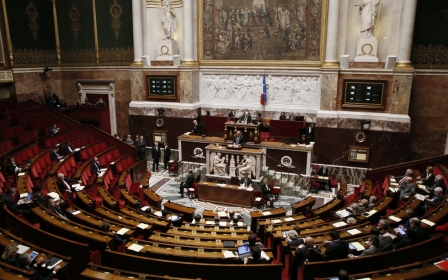Elections loom in Israel as Netanyahu fails to appease coalition partners

Snap elections are on the horizon in Israel after Prime Minister Benjamin Netanyahu failed on Monday night to reach an agreement with his coalition partners over key policy decisions, including the Jewish nation-state bill.
Finance Minister Yair Lapid, of the centrist Yesh Atid party, said he would be pulling out of Israel’s governing coalition after rejecting demands from the Prime Minister to drop opposition to Netanyahu’s version of the Jewish nation-state bill and freeze plans for an exemption from value-added tax (VAT) for first time home buyers, Yesh Atid’s flagship economics policy.
He also demanded Lapid transfer NIS 6 billion ($1.5 billion) to the defence budget, and release funds required by the Israeli military to complete the relocation of training bases to the southern Negev.
A source in Yesh Atid told Ynet news after the discussion that Netanyahu had been planning to torpedo the meeting from the beginning, “even before Lapid opened the doors to his office.”
“Netanyahu read out the demands like one reads to a child,” he said.
Prior to the meeting with Lapid – during which the Prime Minister exhorted him to stop “sabotaging the work of the government” – Netanyahu had warned that continuation of the coalition would rest on the outcome of the hour-long discussion. Its failure makes elections almost inevitable.
“If the unprecedented behaviour of some government ministers continues, there will be no choice but to go to elections again,” said Netanyahu in a statement, shortly after the meeting.
Aryeh Deri, chairman of the ultra-Orthodox Shas party, called on the different party heads to "meet at once and to reach an agreement for setting a date as quickly as possible for elections" signalling a withdrawal of support for the continuation of the coalition.
Without Shas, often referred to as “king-makers” in Israeli politics, Netanyahu will not be capable of forming an alternative coalition.
Sources from Justice Minister Tzipi Livni’s Hatnua party also accused Netanyahu of a stitch-up.
“The [so-called] effort to stabilize the coalition was a bluff. Netanyahu closed a deal with the Haredi [ultra-Orthodox] parties and with [Economy Minister Naftali] Bennett. The whole affair was meant to cover up this deal and present demands for elections,” the sources told Ynet.
Livni described any upcoming elections as a fight against “extremism.”
“These [will be] elections between the Israeli Zionist camp and dangerous extremists who must be prevented from taking control of the State of Israel and destroying it,” she said on Monday evening.
Government 'must work in harmony'
Tensions have been evident in the government for some time, with Netanyahu lambasting Lapid for a lack of “loyalty.”
“I believe a government must work in harmony,” Netanyahu said, shortly before meeting with the Finance Minister.
“In an effort to reach [such harmony], I’ve supported measures I didn’t completely agree with, like the zero-VAT bill. Unfortunately, I haven’t enjoyed the same support or fulfilment of even the most basic obligation – the loyalty and responsibility of ministers to the government in which they serve.”
He also attacked their failure to support the construction of settlements in occupied East Jerusalem.
“Even construction in Jerusalem has become a controversial subject for them,” he said, claiming their opposition to settlement-building would strengthen “international criticism of Israel.”
“I demand that they close ranks behind the correct policy for leading the country – for its security, its economy and lowering the cost of living,” he added.
“If they agree to do so, we can continue to work together. If they refuse, we’ll draw conclusions and go to the voters.”
Earlier on Monday, during a meeting with his party, Lapid had urged the Prime Minister not to call elections, claiming there was still time to mend the rift.
“The public expects statesmanlike behaviour from us,” he said.
“The cabinet approved this budget, as well as the zero-VAT law. The prime minister supported both of them. He sat next to me, voted for both of them and promised me he would work to pass them both.”
He warned that new elections would “paralyze the economy, delay programs meant to benefit the public and disrupt work plans.”
The controversial Jewish nation-state bill – which would see collective rights for Jews in Israel, but only individual rights for Arab-Israelis – has been seen as the straw that broke the camel’s back, provoking opposition from both Lapid and Livni and provoking accusations that it will leading Israel down a road towards an official “Jewish apartheid state.”
"I will not lend a hand to this bill. I will not vote for it," Livni previously told Israel's Channel 2 News. "I am thinking of voting against. I certainly won't let the proposal pass as long as it depends on me. I won't allow the bill to pass while I am in the bathroom."
Lapid, for his part, had voiced support for a more watered-down variation on the bill.
Israel going 'backwards'
Opposition leaders on Monday had already submitted a draft law calling for the dissolution of the Knesset claiming the government was “no longer functioning.”
Isaac Herzog, leader of the Labour Party, claimed that the coalition was “engaged in conflicts instead of managing the affairs of state.”
"This government is floundering and dragging us backwards and this needs to be stopped," he added.
Echoing his sentiments, Zahava Gal-On, leader of the left-wing Meretz Party, warned that democracy and human rights were being undermined.
"The Israeli community suffers economic gaps, and there has not been any progress towards the peace process," she said, calling for the dissolution of the Knesset.
Tensions have reached new peaks in Israel and the occupied Palestinian territories in recent weeks, with violence continually flaring up in East Jerusalem and the West Bank.
Dimi Reider, a journalist and Associate Fellow at the European Council on Foreign Relations, told Middle East Eye that Netanyahu had wanted elections for some time.
“He was still ahead in the polls, but this was being eroded by Jerusalem and discontent over the Gaza war,” he said. “He was facing the beginning of various rebellions within his own party, so if he waited out his term, he might not have made it to the next one, so he was aiming for elections as soon as possible.”
Reider told MEE that Netanyahu had allowed various crises in the government to "explode" and that his admonishments to Lapid on Monday were "just so insulting that Lapid had to refuse and walk out of the government and then Netanyahu can say ‘well I didn’t want elections, I wanted stable government, but it’s impossible to work with this person.'”
“What Netanayahu wants is a right-wing government without all this Lapid nonsense and he’s probably going to get it,” he said.
A possible outcome of any future right-wing government, lacking any major liberal or centrist party, was a strengthening of the left-wing opposition in Israel, Reider told MEE.
"It will make the government easier to oppose," he said. "We've had staunch right-wing governments and very little effective opposition from the left, the left is still in very bad shape."
"Having said that, an unequivocally right-wing government will make it a lot easier for people who pressure from the outside to do so, because they won't have any kind of a fig leaf."
New MEE newsletter: Jerusalem Dispatch
Sign up to get the latest insights and analysis on Israel-Palestine, alongside Turkey Unpacked and other MEE newsletters
Middle East Eye delivers independent and unrivalled coverage and analysis of the Middle East, North Africa and beyond. To learn more about republishing this content and the associated fees, please fill out this form. More about MEE can be found here.




